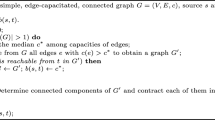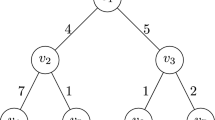Abstract
We study the min-cost chain-constrained spanning-tree (MCCST) problem: find a min-cost spanning tree in a graph subject to degree constraints on a nested family of node sets. We devise the first polytime algorithm that finds a spanning tree that (i) violates the degree constraints by at most a constant factor and (ii) whose cost is within a constant factor of the optimum. Previously, only an algorithm for unweighted CCST was known (Olver and Zenklusen in Proceedings of the 16th IPCO, pp 324–335, 2013), which satisfied (i) but did not yield any cost bounds. This also yields the first result that obtains an O(1)-factor for both the cost approximation and violation of degree constraints for any spanning-tree problem with general degree bounds on node sets, where an edge participates in a super-constant number of degree constraints. A notable feature of our algorithm is that we reduce MCCST to unweighted CCST (and then utilize Olver and Zenklusen in Proceedings of the 16th IPCO, pp 324–335, 2013) via a novel application of Lagrangian duality to simplify the cost structure of the underlying problem and obtain a decomposition into certain uniform-cost subproblems. We show that this Lagrangian-relaxation based idea is in fact applicable more generally and, for any cost-minimization problem with packing side-constraints, yields a reduction from the weighted to the unweighted problem. We believe that this reduction is of independent interest. As another application of our technique, we consider the k -budgeted matroid basis problem, where we build upon a recent rounding algorithm of Bansal and Nagarajan (Proceedings of IPCO 2016. arXiv:1512.02254, 2015) to obtain an improved \(n^{O(k^{1.5}/\epsilon )}\)-time algorithm that returns a solution that satisfies (any) one of the budget constraints exactly and incurs a \((1+\epsilon )\)-violation of the other budget constraints.
Similar content being viewed by others
Notes
Such general degree constraints arise in the context of finding thin trees [1], where \(\mathcal {S}\) consists of all node sets, which turn out to be a very useful tool in devising approximation algorithms for asymmetric TSP.
References
Asadpour, A., Goemans, M., Madry, A., Oveis Gharan, S., Saberi, A.: An \(O(\log n/\log \log n)\)-approximation algorithm for the asymmetric traveling salesman problem. In: Proceedings of the 20th SODA, pp. 379–389 (2010)
Bansal, N., Khandekar, R., Könemann, J., Nagarajan, V., Peis, B.: On generalizations of network design problems with degree bounds. Math. Program. 141(1–2), 479–506 (2013)
Bansal, N., Khandekar, R., Nagarajan, V.: Additive guarantees for degree-bounded directed network design. SICOMP 39(4), 1413–1431 (2009)
Bansal, N., Nagarajan, V.: Approximation-friendly discrepancy rounding. To appear in Proceedings of IPCO 2016. Also appears as arXiv:1512.02254 (2015)
Chaudhuri, K., Rao, S., Riesenfeld, S., Talwar, K.: What would Edmonds do? Augmenting paths and witnesses for degree-bounded MSTs. Algorithmica 55, 157–189 (2009)
Chekuri, C., Vondrak, J., Zenklusen, R.: Dependent randomized rounding via exchange properties of combinatorial structures. In: 51st FOCS (2010)
Fürer, M., Raghavachari, B.: Approximating the minimum-degree Steiner tree to within one of optimal. J. Algorithms 17(3), 409–423 (1994)
Goemans, M.: Minimum bounded degree spanning trees. In: 47th FOCS (2006)
Grandoni, F., Ravi, R., Singh, M., Zenklusen, R.: New approaches to multi-objective optimization. Math. Program. 146(1–2), 525–554 (2014)
Jain, K.: A factor 2 approximation algorithm for the generalized Steiner network problem. Combinatorica 21, 39–60 (2001)
Könemann, J., Ravi, R.: A matter of degree: improved approximation algorithms for degree-bounded minimum spanning trees. SICOMP 31, 1783–1793 (2002)
Könemann, J., Ravi, R.: Primal-dual meets local search: approximating MST’s with nonuniform degree bounds. In: Proceedings of the 35th STOC, pp. 389–395 (2003)
Linhares, A., Swamy, C.: Approximating min-cost chain-constrained spanning trees: a reduction from weighted to unweighted problems. In: Proceedings of the 18th IPCO, pp. 38–49 (2016)
Olver, N., Zenklusen, R.: Chain-constrained spanning trees. In: Proceedings of the 16th IPCO, pp. 324–335 (2013)
Ravi, R., Marathe, M., Ravi, S., Rosenkrantz, D., Hunt III, H.: Approximation algorithms for degree-constrained minimum-cost network-design problems. Algorithmica 31(1), 58–78 (2001)
Singh, M., Lau, L.: Approximating minimum bounded degree spanning trees to within one of optimal. In: Proceedings of the 39th STOC, pp. 661–670 (2007)
Zenklusen, R.: Matroidal degree-bounded minimum spanning trees. In: Proceedings of the 23rd SODA, pp. 1512–1521 (2012)
Author information
Authors and Affiliations
Corresponding author
Additional information
A preliminary version [13] appeared in the Proceedings of the 18th IPCO, 2016.
Research supported partially by NSERC Grant 327620-09 and the second author’s Discovery Accelerator Supplement Award, and Ontario Early Researcher Award.
Proofs omitted from the main body
Proofs omitted from the main body
Proof of Lemma 2.1
Let \({{\mathrm{span}}}(x,\mathcal {L})\) denote the vector space spanned by \(\{\chi ^{x,E(A)}\}_{A\in \mathcal {L}}\). We say that two sets \(A,B\subseteq V\) cross, if \(A\cap B, A\setminus B, B\setminus A\) are all non-empty. Suppose the statement is false. Among all sets T whose spanning-tree constraints are tight at x and \(\chi ^{x,E(T)}\notin {{\mathrm{span}}}(x,\mathcal {L})\), pick one, say S, that crosses the fewest number of sets in \(\mathcal {L}\).
Note that S must cross a non-zero number of sets in \(\mathcal {L}\), otherwise this would contradict the fact that \(\mathcal {L}\) is a maximal laminar family of sets whose spanning-tree constraints are tight at x. Let \(A\in \mathcal {L}\) be an inclusion-wise minimal set of \(\mathcal {L}\) such that S and A cross. Since the function \(T\mapsto x\bigl (E(T)\bigr )\) is supermodular, we have
It follows that the spanning-tree constraints for \(S\cap A\) and \(S\cup A\) are also tight at x, and the inequality above is in fact an equality. So \(x_e=0\) for all edges e with one end in \(S\setminus A\) and one end in \(A\setminus S\), and hence \(\chi ^{x,E(S\cap A)}+\chi ^{x,E(S\cup A)}=\chi ^{x,E(S)}+\chi ^{x,E(A)}\). This implies that \(\chi ^{x,E(S\cap A)}\) and \(\chi ^{x,E(S\cup A)}\) cannot both lie in \({{\mathrm{span}}}(x,\mathcal {L})\) as this would imply that \(\chi ^{x,E(S)}\in {{\mathrm{span}}}(x,\mathcal {L})\). Finally, note that both \(S\cap A\) and \(S\cup A\) cross fewer sets of \(\mathcal {L}\) than S. This yields a contradiction to our choice of S above. \(\square \)
Proof of Lemma 3.1
This follows from essentially the same potential-function argument as used in [14] to obtain a rainbow-free solution. Sort the edges of \({{\mathrm{supp}}}(x)\) in increasing order of \(|\mathcal {S}_e|\) breaking ties arbitrarily. Let \(e_1, e_2, \ldots , e_{k}\) denote this ordering. Let \(w \in {\mathbb {R}}^E\) be any weight function such that \(w_{e_1}< w_{e_2}< \dots < w_{e_{k}}\) (e.g., \(w_{e_i} = i\) for all i). Let \(x'\) be an optimal solution to the following LP. (Note that the LP has variables \(\{z_e\}_{e \in E}\), and that the \(\{x_e\}_{e \in E}\) values are fixed.)


Properties (i) and (iii) hold by construction. Since we force the spanning-tree constraints corresponding to sets in \({\mathcal {L}}\) to be tight, we can start with \(\mathcal {L}\) and extend it to obtain a laminar decomposition \(\mathcal {L}'\) of \(x'\) that refines \(\mathcal {L}\), so (ii) holds.
It remains to show that \((x',\mathcal {L}')\) is a rainbow-free decomposition. Consider any set \(L\in \mathcal {L}'\) and any two edges \(e,f\in {{\mathrm{supp}}}(x')\cap E^{{\mathcal {L}}'}_L\), and suppose that e, f form a rainbow. Let \(w_e<w_f\), so we must have \(\mathcal {S}_e\subseteq \mathcal {S}_f\). Now perturb \(x'\) by adding \(\epsilon \) to \(x'_e\) (the argument below will show that \(x'_e<1\)) and subtracting \(\epsilon \) from \(x'_f\), where \(\epsilon >0\) is chosen to be suitably small; let \(x''\) be this perturbed vector. Clearly, \(w^\intercal x''<w^\intercal x'\), so if we show that \(x''\) is feasible to (P’), then we obtain a contradiction. Clearly, \({{\mathrm{supp}}}(x'')\subseteq {{\mathrm{supp}}}(x)\). Since \(\mathcal {S}_e\subseteq \mathcal {S}_f\) it follows that \(x''\bigl (\delta (S)\bigr )\le x\bigl (\delta (S)\bigr )\) for all \(S\in \mathcal {S}\). Also, \(x''\bigl (E(L)\bigr )=x'\bigl (E(L)\bigr )=|L|-1\) for all \(L\in \mathcal {L}\).
Finally, we show that \(x''\in \text {P}_{\text {ST}}(G)\) for a sufficiently small \(\epsilon >0\). (Hence, \(x'_e<x''_e\le 1\).) For \(A\subseteq V\) such that \(x'\bigl (E(A)\bigr )<|A|-1\), we obtain \(x''\bigl (E(A)\bigr )\le |A|-1\) by taking \(\epsilon >0\) suitably small; for A with \(x'\bigl (E(A)\bigr )=|A|-1\), we obtain \(x''\bigl (E(A)\bigr )=|A|-1\) since the spanning-tree constraints for all \(L\in \mathcal {L}'\) are tight at (\(x'\) and) \(x''\) and these span all other spanning-tree constraints that are tight at \(x'\) (Lemma 2.1). \(\square \)
Rights and permissions
About this article
Cite this article
Linhares, A., Swamy, C. Approximating min-cost chain-constrained spanning trees: a reduction from weighted to unweighted problems. Math. Program. 172, 17–34 (2018). https://doi.org/10.1007/s10107-017-1150-7
Received:
Accepted:
Published:
Issue Date:
DOI: https://doi.org/10.1007/s10107-017-1150-7




